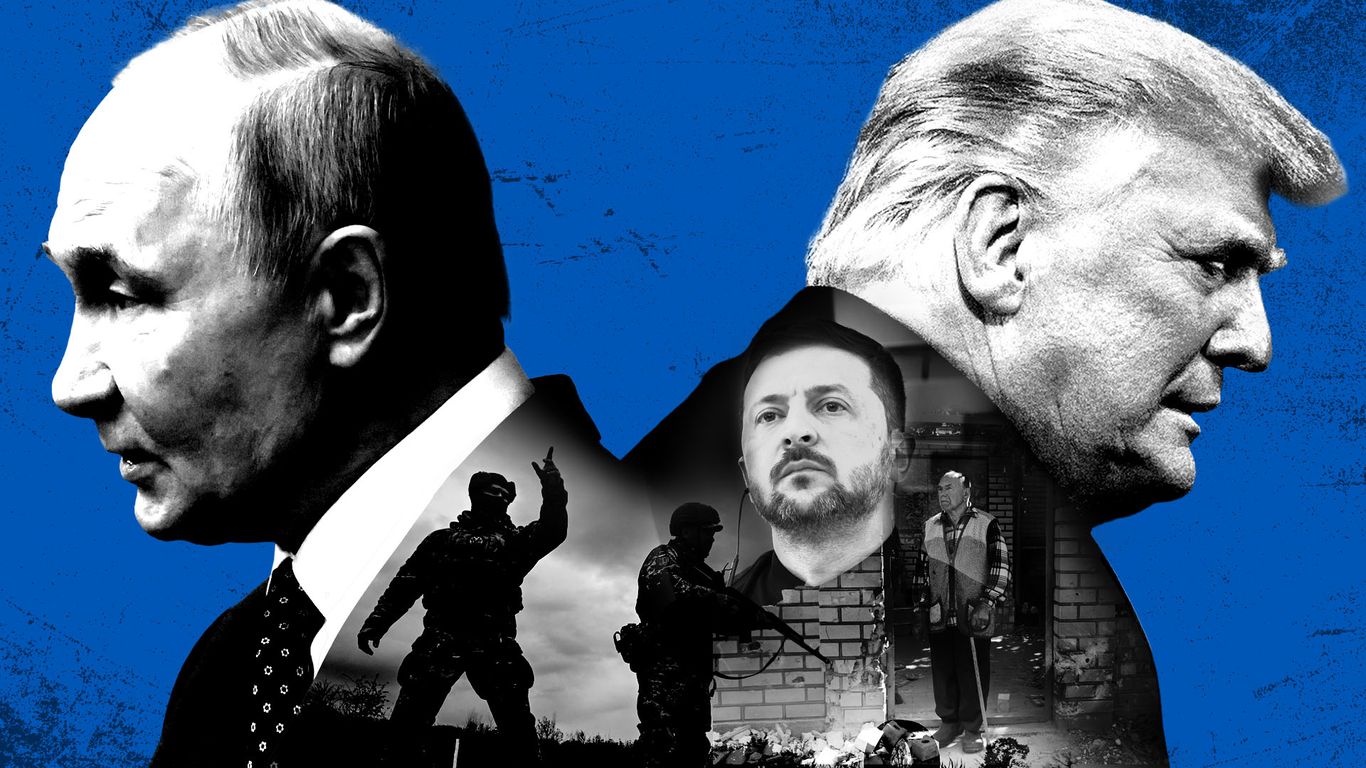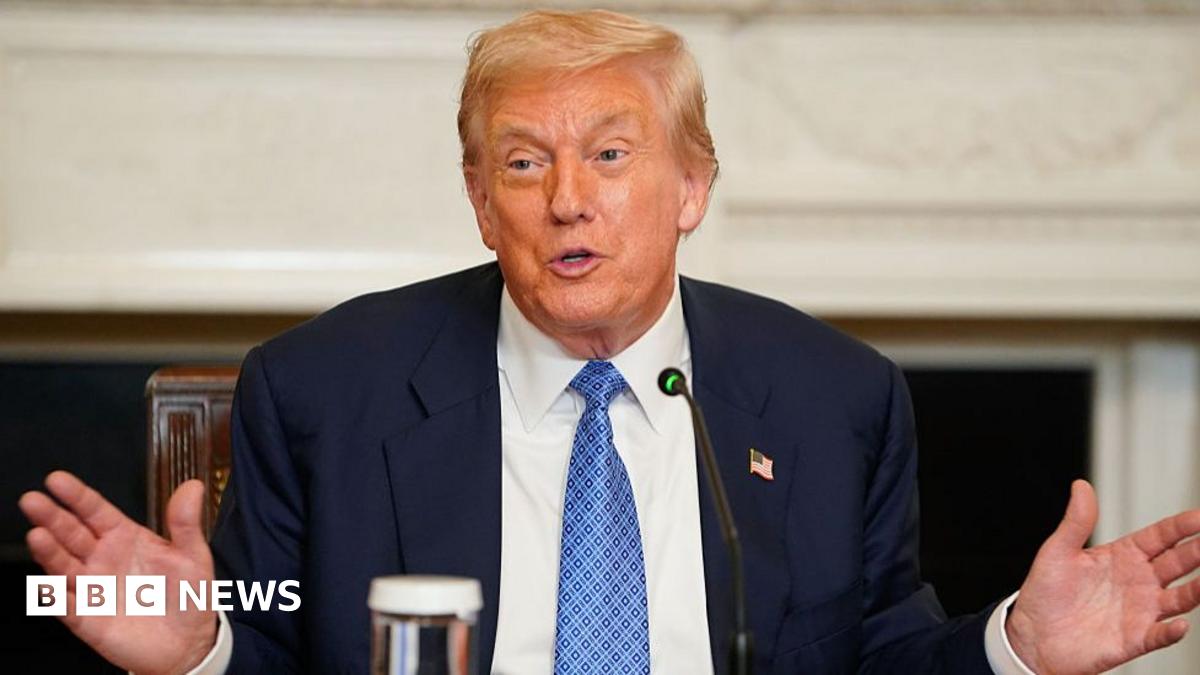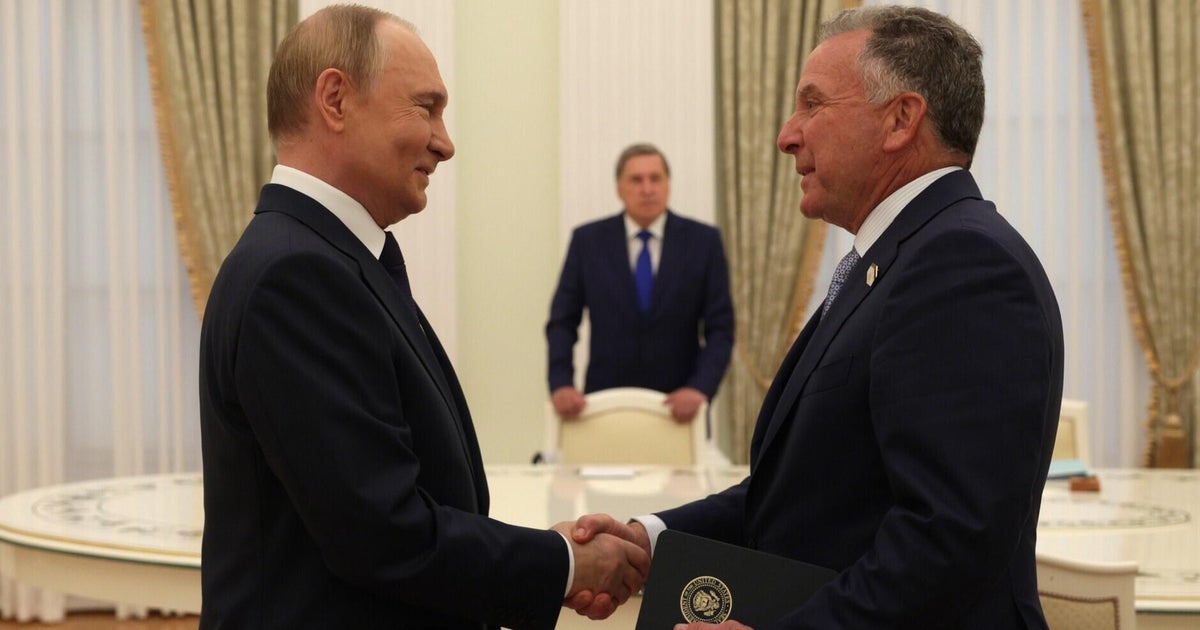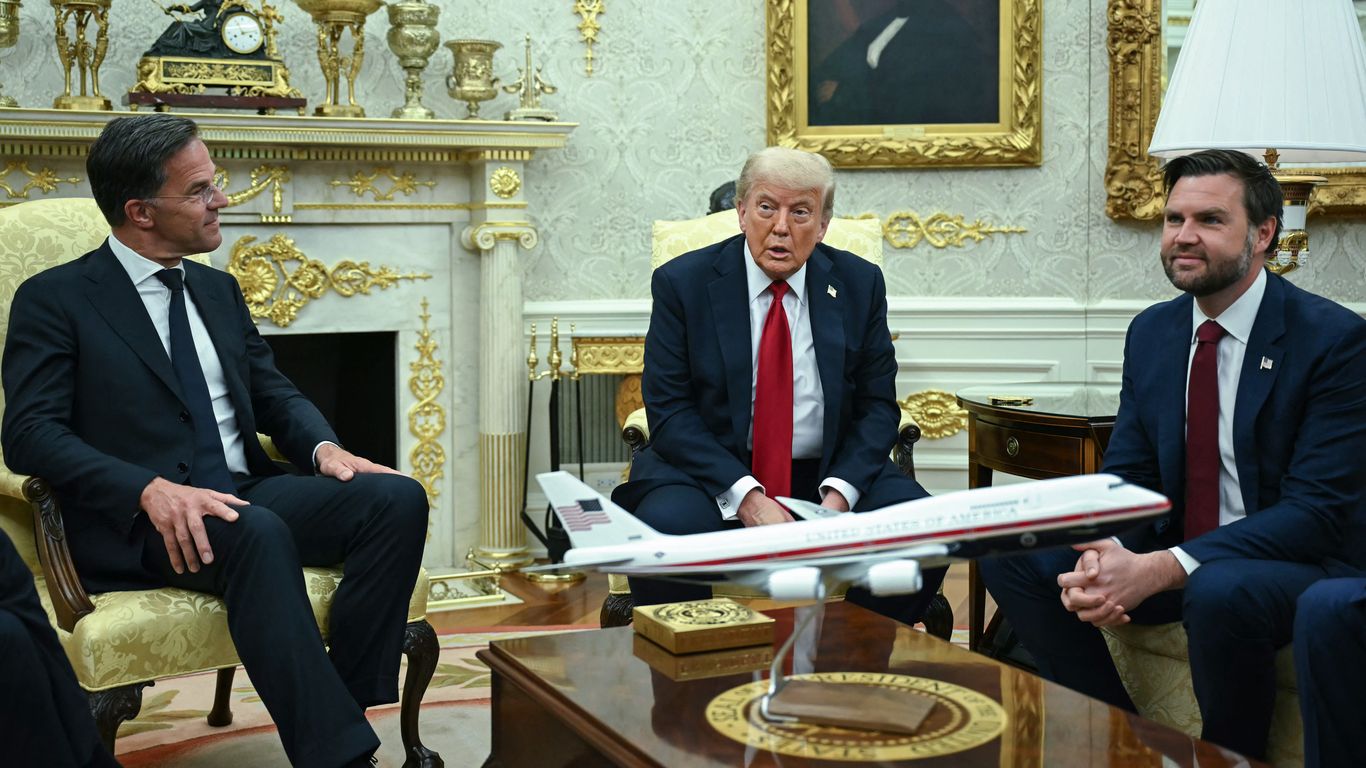Trump Warns Putin of Consequences for Continued War in Ukraine

Introduction
U.S. President Donald Trump has issued a warning to Russian President Vladimir Putin, stating that there will be “very severe consequences” if he continues his war in Ukraine. This statement comes amidst ongoing tensions between the two nations, with Russia’s annexation of Crimea in 2014 and ongoing support for separatist rebels in eastern Ukraine.
Key Details
In an interview with AP News, Trump emphasized the importance of resolving the conflict in Ukraine, stating that it is a “big problem” and that he believes he can get along with Putin. However, he also made it clear that if Putin does not agree to stop his war in Ukraine, there will be serious repercussions.
This warning from Trump comes at a time when tensions between Russia and Ukraine have escalated, with recent clashes in the Black Sea and the seizure of Ukrainian ships by Russia. The U.S. has been a vocal supporter of Ukraine in this conflict and has imposed sanctions on Russia in response to its actions.
Impact
The potential consequences of Putin’s continued war in Ukraine could have far-reaching effects, not only on the region but on the relationship between the U.S. and Russia. With Trump’s warning, it is clear that the U.S. is not willing to tolerate Russia’s aggression, and it remains to be seen how Putin will respond to this ultimatum.
Donald John Trump, born June 14, 1946, in Queens, New York, is an American businessman, media personality, and politician. He graduated from the University of Pennsylvania’s Wharton School in 1968 with a degree in economics. In 1971, he took over his family’s real estate business, renaming it the Trump Organization, through which he expanded into building and managing skyscrapers, hotels, casinos, and golf courses. Trump gained widespread fame as the host of the reality TV show *The Apprentice* from 2004 to 2015, which helped establish his public persona as a successful entrepreneur.
Trump entered politics as a Republican and was elected the 45th president of the United States, serving from 2017 to 2021. His presidency was marked by significant policy actions including tax cuts, deregulation, the appointment of three Supreme Court justices, renegotiation of trade agreements (notably replacing NAFTA with the USMCA), and a focus on immigration control including border wall expansion. He withdrew the U.S. from international agreements such as the Paris Climate Accord and the Iran nuclear deal, and engaged in a trade war with China. His administration’s response to the COVID-19 pandemic was criticized for downplaying the virus’s severity. Trump was impeached twice by the House of Representatives—first in 2019 for abuse of power and obstruction, and again in 2021 for incitement of insurrection—but was acquitted by the Senate both times.
After losing the 2020 election to Joe Biden, Trump challenged the results, culminating in the January 6, 2021, Capitol riot. He remains a central figure in American politics, having won the 2024 presidential election and returned as the 47th president in 2025, continuing to promote policies aimed at economic growth, border security, and military strength[1][2][3][4]. Vladimir Putin is the current President of Russia, a position he has held for multiple terms since 2000, with a brief interlude as Prime Minister from 2008 to 2012[1][3]. Born in Leningrad (now Saint Petersburg) in 1952, Putin began his career in the Soviet Union’s security services, joining the KGB in 1975 and rising to the rank of Lieutenant Colonel by the time he left in 1991, following postings in East Germany and Leningrad[4]. After the Soviet Union’s collapse, he transitioned into politics, serving as an adviser to Saint Petersburg Mayor Anatoly Sobchak and later moving to Moscow, where he held various administrative roles under President Boris Yeltsin[6].
Putin was appointed Prime Minister in August 1999 and became acting President when Yeltsin unexpectedly resigned that December[3][6]. He won his first presidential election in March 2000, promising to stabilize Russia’s economy and political system after the tumultuous 1990s[3][7]. During his initial terms, he centralized power, reasserted federal control over Russia’s regions, and curtailed the influence of the country’s oligarchs through legal and economic measures[7]. Putin was re-elected in 2004 but, due to constitutional term limits, stepped aside in 2008, becoming Prime Minister under his successor Dmitry Medvedev, while retaining significant influence[3]. Constitutional amendments later extended presidential terms, and Putin returned to the presidency in 2012[1].
Putin’s time in office has been marked by assertive foreign policy, including military interventions in Syria in support of President Bashar al-Assad and the 2014 annexation of Crimea, which led to international sanctions[1]. Domestically, his tenure has seen increased state control over media, the suppression of political opposition, and constitutional changes consolidating executive authority[1]. In 2022, Russia’s full-scale invasion of Ukraine triggered a major international crisis, further isolating Russia from the West and prompting widespread condemnation[1].
As of 2025, Putin remains a dominant figure in Russian politics, having secured another term in office through constitutional changes that allow him to potentially remain president until 2036[1]. His leadership continues to shape Russia’s domestic trajectory and its role in global affairs, amid ongoing conflict in Ukraine and strained relations with NATO and Western countries[1]. ## Overview
The Associated Press (AP) is the world’s largest newsgathering organization, operating as a nonprofit cooperative owned by its member newspapers and broadcasters in the United States[1][7]. It delivers news, photographs, video, and audio to over 1,700 member newspapers, 6,000 broadcasters, and 8,500 other subscribers in 110 countries[1]. AP’s mission is to advance the power of facts through independent, nonpartisan, and fact-based journalism, reaching an estimated four billion people daily[4][7].
## History
AP was founded in 1846 when five New York City newspapers pooled resources to share the cost of covering the Mexican-American War, pioneering the concept of cooperative newsgathering[3][4][8]. Originally known as the New York Associated Press, it expanded as regional groups formed and merged, leading to the modern AP’s incorporation in 1900 after legal and organizational shifts[2][3]. From the start, AP focused on accurate, timely reporting—a tradition that continues today[4][7].
## Key Achievements
AP has been a pioneer in news technology, establishing the first leased telegraph wires for news transmission in 1875 and launching innovative services like APTN (television news) and AP All News Radio[1][5]. Its journalists have won 59 Pulitzer Prizes, including 36 for photography, reflecting a consistent commitment to excellence[7]. AP has reported on every major global event since the mid-19th century, from wars and elections to cultural milestones[4][6].
## Current Status
Today, AP operates nearly 250 bureaus in almost 100 countries, producing approximately 400,000 stories, 80,000 videos, and 1.2 million photos annually[4][7]. It remains financially independent, funded by its members and subscribers rather than government or private ownership, ensuring editorial independence[6][7]. AP’ Russia, officially known as the Russian Federation, is not an organization but a sovereign state and the largest country in the world by land area, spanning Eastern Europe and northern Asia. With a population of nearly 144 million as of 2025, Russia ranks ninth globally by population and is characterized by significant ethnic diversity, with over 80% identifying as ethnic Russians and numerous minority groups contributing to its cultural tapestry[4]. The capital, Moscow, is a major global city and the country’s political, economic, and technological hub.
## Historical Overview
Russia’s history is marked by its transformation from the Tsarist Empire to the Soviet Union and, after its dissolution in 1991, to the present-day Russian Federation. The post-Soviet era saw Russia’s integration into the global economy, though it retained a centralized political system with power concentrated in the presidency[7]. The country’s economy, historically resource-based, relies heavily on oil, gas, and minerals, but has also developed significant industrial, technological, and military sectors.
## Economic Profile and Key Achievements
Russia’s economy is the world’s twelfth-largest consumer market, with about 70% of GDP driven by domestic consumption[1]. It has a “very high” Human Development Index ranking and boasts the fifth-highest number of billionaires globally, though income inequality and regional disparities remain pronounced[1]. Major achievements include surviving extensive Western sanctions after the 2022 invasion of Ukraine, maintaining economic stability through increased military spending, and pivoting energy exports to Asia[1][5]. The country has also played a leading role in the BRICS bloc, advocating for reforms in the international financial system and promoting technological innovation among developing economies[6].
## Current Status and Challenges
As of late 2025, Russia’s economy is experiencing a pronounced slowdown, with GDP growth cooling to around 1% after robust expansion in 2023–2024[2][3]. High military expenditure ( Discover related stories and their connections to this article Explore connected events with detailed insights and relationships Key entities mentioned across connected events Discover patterns and trends across related stories Zohran Mamdani meets President Trump at the White House to discuss a $21B housing plan for Sunnyside Yard and bipartisan housing reform. CNN review finds dozens of FBI witness interviews missing from Epstein files, fueling questions about transparency. Casey Means, Trump's surgeon general pick, faces uphill confirmation amid vaccine questions and Kennedy health policy ties. U.S. Secretary of State Marco Rubio plans a March 2-3 visit to Israel as Iran tensions rise over nuclear talks and regional security. Exploring White House push for Israel to strike Iran first, amid worries of retaliation, casualties, and political calculations.About the People Mentioned
Donald Trump
Vladimir Putin
About the Organizations Mentioned
AP News
Russia
🔗 Connected Events Overview
📊 Quick Insights
📅 Connected Events Timeline
👥 People Involved in Connected Events
Connected through:
Connected through:
🏢 Organizations & Products
🏢 Organizations
🛍️ Products
💡 Connected Events Insights
🔥 Trending Topics
Trending Blogs in Politics
Mamdani's Bold White House Pitch to Trump

Missing FBI Records Spark Epstein Files Controversy

Casey Means Faces Uphill Battle as Surgeon General Nominee in Vaccine Scrutiny
Rubio's High-Stakes Israel Visit Amid US-Iran Tensions

White House Strategy: Israel Might Strike Iran First









